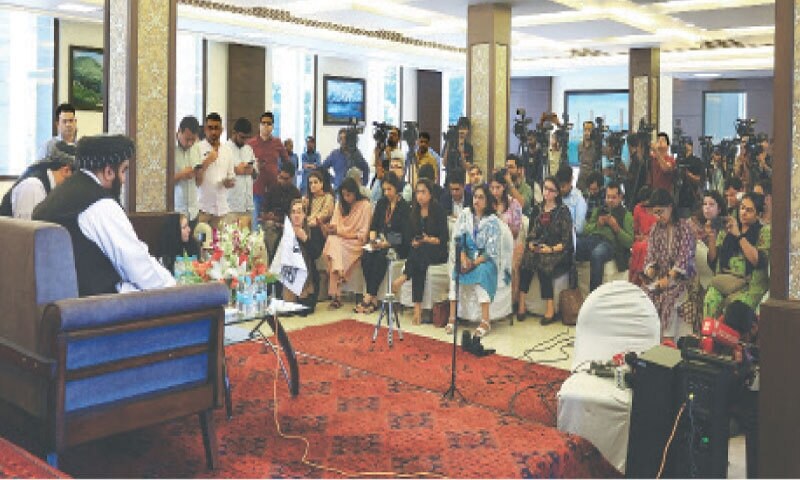
• Taliban foreign minister claims omission of women journalists from his first media interaction was ‘unintentional’
• UN terms Afghan restrictions on women ‘gender apartheid’
• India’s Ministry of External Affairs denies any role in Friday’s press interaction at Afghan embassy
A PICTURE is worth a thousand words — and the image splashed across Indian newspapers on Monday, showing female journalists seated prominently in the front row at the Taliban foreign minister’s press conference in Delhi, perfectly embodies that sentiment.
The conference — Amir Khan Muttaqi’s second press event at the Afghan embassy within 48 hours — was convened following widespread outrage over the exclusion of female journalists from his initial briefing on Friday, BBC News reported.
Mr Muttaqi said at Sunday’s conference that the exclusion was unintentional and not “deliberate”.
“With regard to the [Friday’s] press conference, it was on short notice and a short list of journalists was decided, and the participation list that was presented was very specific.
“It was more a technical issue… Our colleagues had decided to send an invitation to a specific list of journalists and there was no other intention apart from this,” he added.
The UN has described the situation in Afghanistan as a form of “gender apartheid,” where women and girls are barred from secondary and higher education, prohibited from visiting parks and gyms, and face growing restrictions on employment. The Taliban government also enforces strict dress codes and limits their freedom of movement.
The Taliban, who regained power in 2021, maintain that they uphold women’s rights in line with their interpretation of Afghan culture and Islamic law. However, Western diplomats say the severe restrictions on women have hindered the group’s efforts to gain international recognition. The curbs on women’s freedoms are widely regarded as the harshest in the world.
Mr Muttaqi had arrived in India on Thursday for a week of high-level talks with the government from Russia, the only country so far to fully recognise their government.
New Delhi has not officially recognised Afghanistan’s de facto rulers but, like several other countries, continues to maintain limited diplomatic engagement — operating a small mission in Kabul and providing humanitarian assistance to the country.
The visit is viewed as a significant step in strengthening ties between the two sides — offering the Taliban a boost in their pursuit of international recognition, while allowing India to advance its strategic and security objectives.
On Friday, Mr Muttaqi met Foreign Minister S Jaishankar who announced that India would reopen its embassy in Kabul which was shut after the Taliban returned to power in 2021.
The press event later in the day was attended by around 16 male reporters while female journalists were turned away from the embassy gates.
India’s Ministry of External Affairs (MEA) clarified that it “had no role” in organising the press interaction, noting that it took place at the Afghan embassy.
However, the exclusion of female journalists on Indian soil sparked strong criticism from politicians and media circles, who faulted the government for allowing it. Opposition leader Rahul Gandhi said that by permitting the event, Prime Minister Narendra Modi was “sending a message to every woman in India that she is too weak to be defended.”
Published in Dawn, October 14th, 2025

